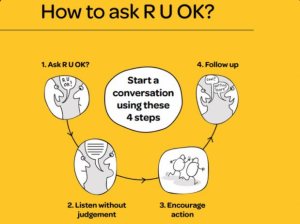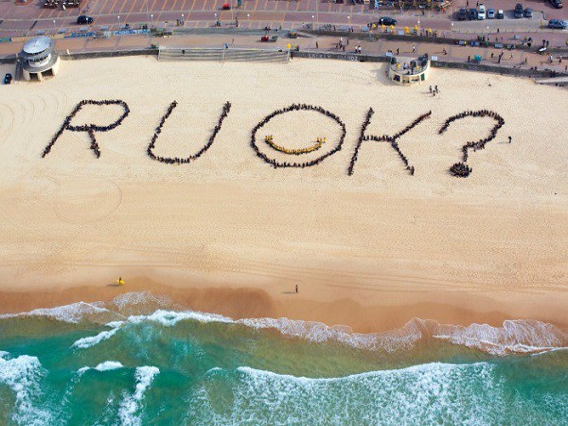In 2016, 2,866 people died from suicide in Australia (Australian Bureau of Statistics, 2017). It’s estimated that every day we lose 8 Australians to suicide and 30 people attempt to end their lives everyday (Lifeline, 2018). Rates of suicide are generally three times higher for males, rural and regional dwellers, and Aboriginal and Torres Strait Islander people (Mindframe National Media Initiative, 2012). With the fastest rate amongst children younger than 15 years (AISRP, 2011) and the leading cause of death for Australians aged between 15 and 44 (Lifeline, 2018).
With statistics like these, no one could fault you if you felt too overwhelmed to tackle this issue. However, there is something quite simple that we can all do to help out…… we can ask, R U OK?
R U OK? is a non-for-profit suicide prevention organisation created by Gavin Larkin back in 2009. Watch the following short YouTube clip to hear from Gavin Larkin and the R U OK? team.
To help spread the word the R U OK? organisation has a day each year called R U OK? Day, a national day of action dedicated to reminding people to ask family, friends, and colleagues the question, “R U OK?”, in a meaningful way, because connecting regularly and meaningfully is one thing everyone can do to make a difference to anyone who might be struggling.
A lot of us see the merit in this campaign but often fall short of asking, R U OK? Often the reason we fall short is because we are unsure on how to have this conversation. Well, the R U OK? organisation has helped us out with this by providing us with some tips. I have done my best to relay the information below to help support you in having this conversation with those you care about.
Getting Ready to Ask:
1. Ask yourself am I ready? Check to see if you feel you are in a good headspace to have this conversation. Also, check to see if you are willing to genuinely listen to this person and can give as much time as is needed to have this conversation?
2. Ask yourself am I prepared? Are you ready for the answer to be “No, I’m not ok”, are you able to suspend the need to “fix” someone’s problems, and do you accept that they may not be ready to talk or want to talk with you.
3. Pick your moment. Make sure you ask the question somewhere private and comfy, if possible, try to choose a time that is good for them to chat, and make sure you have the time to chat.
How to Ask:
1. Ask R U Ok? To the best of your ability take a relaxed, friendly and concerned approach. Ask some follow up questions to help them open up (e.g., “What’s been happening?” OR “How have you been?). Mention any specific things that have made you concerned (e.g., “I’ve noticed you have been quiet and withdrawn lately.”).
2. Listen without judgement. Take what they say seriously and do not interrupt or rush the conversation. Don’t judge their experiences or reactions. Acknowledge that things are tough for them. Use silence. Often someone needs time to think. Don’t fill the gaps. Show you are listening by paraphrasing back what they have said and check for understanding.
3. Encourage action. Check if they have done anything to help themselves. Check if there is anything you could do to support them. Check if there is something they think they could do to support themselves right now. Encourage them to seek professional help.
4. Check in. Stay in touch and be there for them. See if they have found ways to help support themselves. Knowing someone cares about you out there can make a real difference.

For more details on how to ask the question and support in dealing with responses, go to https://www.ruok.org.au/how-to-ask
I am hoping you are now feeling more prepared to have this conversation if need be. I would also like to invite you all to ask yourself R U OK? And when you do: listen to your response without judgement; encourage action within yourself; check in regularly with yourself and don’t forget to let a trusted friend, family member, or colleague know if you are not OK.
Please share this article with others and on your social media to spread the word.
If you or anyone you know is struggling with thoughts of suicide please contact one of the following services:
In case of emergency 000
Life line 13 11 14
Suicide Call Back Service: Mental health counselling and suicide prevention 1300 659 467
Kids Helpline (for people up to the age of 25) 1800 551 800
References:
Facts and Statistics, Mindframe National Media Initiative, 2012.
“Main Features – Intentional self-harm key characteristics”. www.abs.gov.au. Australian Bureau of Statistics. Archived from the original on 25 December 2017.
ruok.org.au Official R U Ok? website
“Statistics on Suicide in Australia”. https://www.lifeline.org.au/about-lifeline/lifeline-information/statistics-on-suicide-in-australia
Trends and predictors of suicide in Australian children, Australian Institute for Suicide Research and Prevention, 2011, archived from the original on 19 February 2012
Share this Post

